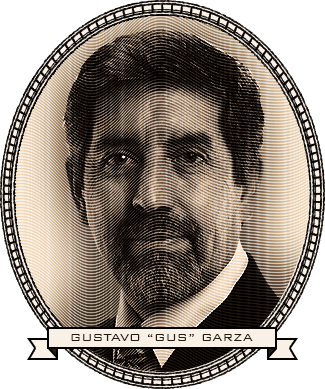January 29th, 2014
Episode 1: James Carlos Cates
The Honorable James Carlos Cates, Uvalde County’s youngest-ever county judge, creeps carefully around the side of his house in the pre-dawn stillness.
Inside, his wife, Larisa, is asleep and very pregnant. If Cates steps on any of the dead limbs or leaves that frequently blow into the yard from the nearby clusters of cedar elms and live oaks (or the Cypress trees that grow along the Sabinal River a hundred yards away), the three dogs sleeping at the foot of Cates’ bed are sure to awaken and bark, disturbing his wife and possibly their two young sons.
Larisa has been sleeping uncomfortably in the final weeks of her pregnancy, and Cates, a loving husband, is concerned about his wife’s comfort and the health of their third child. He approaches the barn behind the house carefully, aware that there are tree roots and gopher mounds to contend with in the final steps before he can put his hand on the door latch and let himself inside.
Cates has been an early riser most of his life, especially when he is stressed. And he has been extremely stressed – almost distressed – ever since he began talking publicly about running for the Texas Legislature. For weeks he’s been sleeping fitfully, often abandoning his bed two or three times a night to read or work or walk.
It had been the same when he ran for the UCISD school board nearly a decade earlier. During the campaign, he had tossed and turned relentlessly throughout the night, and Larisa would often wake to find herself in bed alone. After searching the house (which she did when they were newlyweds, but no longer) she would often find her husband in the family room, rereading the book that had inspired his interest in returning home to get involved in public education.
At that age, he was still feeling guilty about his family’s wealth. The book had touched a nerve. He and Larisa had married during spring break of their senior year at Rice University, then immediately moved back to Uvalde, taking up residence in one of his family’s many homes so that Cates could run for office and work for the family business. He was embarrassed by his family’s money, but he was smart enough, even as an idealistic young man, to recognize that he and his wife may need it some day.
“Another campaign, is that really what you want?” mutters Cates, chastising himself as he opens the barn door and slips inside.
The switches for the overhead lights are within arm’s reach of the entrance. He flips the middle switch, partially illuminating the front half of the barn.
It isn’t the school board he is thinking about as he moves around the barn gathering feed for the chickens, their goat, Charlie, and their milk cow, Lucy. His time on the school board had been a source of great pride and pleasure, despite the frustrations that always accompany public office.
Nor is the source of his agitation to be found in his move to San Antonio after the expiration of his school board term. When they moved, he told himself he wanted to be closer to the headquarters of Cates Enterprises, the privately held umbrella organization that oversees his family’s extensive manufacturing, agriculture and mineral interests in South Texas and Mexico. But only months after moving there, he ran for a seat on the San Antonio City Council. Despite the criticism from opponents that he was a carpetbagger, he won and successfully served two terms.
No, it is the ill fated run for Congress that is giving him heartburn as he putters around the barn, considering whether or not to drive up to Austin this afternoon to file his intent to run for the Texas Legislature.
Is he crazy? Larisa certainly thinks so. As Cates spent more and more time online relentlessly attacking Speaker Garza for his “shady” dealings during the last legislative session, Larisa continuously reminded him about that “goddamn congressional race.”
A less than reputable consultant had convinced Cates to run to the right of a left-leaning democrat during the immigration debates in which Congress was mired at the time. He had spent most of his personal money and some family money on the campaign, only finding out after his loss what many insiders knew the whole time – the race was always his opponent’s to win. A few friends had tried to tell him what was happening during the campaign, but he had been so caught up in it all that he hadn’t listened.
The loss had been a devastating blow to he and Larisa, and she has made it clear more than once in recent days that she does not want to relive that experience. Nor does she care about Speaker Garza. All she cares about is their home and their children. She wants her husband at her side.
After the animals’ feed buckets are filled, Cates goes to the gun safe. He types in his code and extracts a large wooden box with a hinged lid, placing it on his workbench. He returns to the door of the barn to peek through a crack at the house to make sure that no one is awake and about to come looking for him. The sun is about to rise. His house remains dark and silent.
They moved back to Uvalde County after he’d lost the congressional run, and they purchased the piece of property they later named “Abundante.” They began farming enough to feed themselves, with a little left over to sell at the farmer’s market nearby, just like Larisa had done at the family farm where she was raised. All the while, Cates worked for the family business and began rebuilding his fortune – and his ego.
But the change of pace, scenery and lifestyle had done nothing to alleviate the back pain that had started during the campaign. Nor did the move to Abundante correct the anchorless anxiety that was always nearby, threatening to drift over and crush him when he least expected it.
Even when Uvalde County’s most powerful families convinced him to run for county judge and assured him that he would be unopposed, he didn’t sleep for weeks until the passage of the filing deadline confirmed that the job was his.
Throughout his political life, Cates had been treated by the same family physician. A few weeks earlier, when Cates told his doctor that he was once again considering a run for public office and was unable to sleep, his doctor had decided to try a new prescription: inhale daily, via vaporizer, .5 grams of marijuana. Half in the morning before his daily walk, and half after he put his children to bed in the early evening.
Cates unpacks the vaporizer from the wooden box, plugs it in, and waits as its quiet fan fills an inflatable bag with cannabinoids. His doctor had encouraged him to set aside his worries – if only for a few minutes – and try to be mindful of his body and his breathing while taking his medicine – but Cates has not yet mastered the technique.
“What’s it gonna be?” he asks himself. “Fight, or stay here and enjoy the quiet?”
Cates looks from the collection of tools along the walls, to the buckets of feed by the door, and then back to the tack and other gear in the shadows at the back of the barn.
He knows, as he has known for a long time, that he can not ignore what is happening. Rural interests in the area are being molested, in the dark, in the name of House politics. And the area’s representative in the Texas House – one of the Speaker’s lieutenants – is doing nothing about it.
He begins to take regular breaths from a long hose attached the vaporizer. As he slowly inhales and exhales, Cates, a chess enthusiast, does what he does best: he plays out the game in his mind.
How can he get at the Speaker and undo the water legislation passed during the recent legislative session? That legislation threatens the rural way of life cherished by his friends, family and neighbors; certainly something has to be done. But what?
Because the Speaker is an official elected from within the Texas House of Representatives by the House membership, it is hard to reach out and affect him from the public side of the legislative equation. And the Speaker has a great deal of support and power through his PAC activities, which insulates him further from retribution.
But, if individual candidates were to have trouble getting elected because of their alliance with the Speaker, other representatives would be wary of supporting the Speaker. Cates knows this instinctively. So the first step is to go after the Speaker’s lieutenants.
As far as Cates can see, he has two choices: he can donate money to candidates who oppose the Speaker’s lieutenants and ask them to help in exchange for his investment. Or he can run against the local lieutenant himself.
If he spends any more of their money on politics, his wife might leave him. So he can either find a way to win a seat at the table himself, without making a personal financial investment, or he can leave it alone and let the game play out without his input.
Cates smiles as he returns the vaporizer to its box, places the box in the safe, and bolts the safe door.
He has too much energy to walk this morning. He opens the barn door to the first light of day, and breaks into a run.













Comments
COMMENT POLICY
The Independent Candidate is pleased to include your comments and observations about this story. We encourage lively debate on the issues of the day, but we ask that you refrain from using profanity or other offensive speech, engaging in personal attacks or name-calling, or posting advertising. To comment, you must be a registered user of The Independent Candidate, and your user name will be displayed. Thank you for sharing your thoughts. We're here to serve.
You must be logged in to leave a comment.
Login | Register